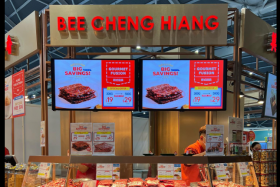Bak kwa brands go online, newer brands say it helps sales
Younger customers receptive; brands say it helps sales
More bak kwa brands are going online as newer players use the Internet sales channels to boost their brand and popularity.
Take for instance, Peng Guan Food Manufacturing, which manufactures the Peng Guan brand of the barbecued pork jerky.
Its co-founder, Mr Zhang Ziyue, 29, a hobby chef turned entrepreneur, said its online presence has given the brand much exposure.
He says: "When we first started two years ago, the publicity was bad. After we worked with Qoo10 and got featured in newspapers, (it) soared."
His company's customer base tripled after listing with local e-commerce site Qoo10 last July, he said.
Peng Guan now has a customer base of more than 1,000 and the average order is 5kg. They are now selling at $42 per kg in the lead-up to Chinese New Year.
Another brand, Xishi Bakkwa by Cecilia Minced & Dried Pork Food Trading, ventured online about five years ago.
Besides its own webstore, its products are also listed on e-commerce sites like Qoo10, deals.com.sg and mobile marketplace Shopee.
About 40 per cent of their sales comes from Internet sales channels, including those placed on its own online platform.
"We see more people buying online but there are also more competitors," says Ms Sandra Koh, 30, who runs the family business. She estimates she is seeing 10 per cent growth online yearly.
New Peng Hiang, which has been around since 1984, ventured online three years ago, starting with Groupon and Qoo10, before building its own website.
It is also listed on SMRT Corp's e-commerce site iMOB and online grocery concierge service honestbee.
Its online sales contributes about 10 to 15 per cent of its total sales.
Business development manager Thomas Khoo says: "Online shopping is able to give us the reach that we couldn't achieve.
'LATE BOOMER'
"Even though the company has more than 30 years of history, we were considered late boomers compared to the bigger and more established bak kwa brands in Singapore.
"We could not achieve the same number of retail outlets when compared to them."
There are also higher risk and costs, such as the rental and labour crunch associated with physical retail outlets, says Mr Khoo.
And the online market targets a different audience - mostly young executives - as compared to retail outlets which attract older consumers, he notes.
Traditional brand Bee Cheng Hiang, however, has not seen a significant increase in demand from its website, which makes up less than 3 per cent of its total local sales.
Its managing director Richard Wong, 58, says: "People still prefer to buy from our retail outlets. If you buy online, you don't get to see the meat barbecued fresh and wrapped up.
"There are certain experiences that e-commerce cannot give to you."
But he acknowledges the importance of the e-commerce trend and says the company started its online ordering platform about 10 years ago.
He says: "We have received orders from the US and Canada. We deliver the orders there but we tell them that during the delivery process, there may be some restrictions."
Its manufacturing arm, Hup Chong, which distributes to supermarkets and other corporate clients, lists some of its products on online grocery service RedMart and Qoo10.
But these are vacuum-packed products that can last for nine months, unlike the fresh bak kwa which can last only about a week.
Mr Wong says: "Nowadays, supermarkets are also going on e-commerce, so we take part to give more choices to our customers."
At the same time, it has taken steps to minimise queue time, such as opening more outlets and hiring more workers during Chinese New Year peak season.
"Online shopping is able to give us the reach that we couldn’t achieve."
— New Peng Hiang business development manager Thomas Khoo
Queuing, not clicking

Despite bak kwa companies joining the online bandwagon, one particular company has stayed its course.
Lim Chee Guan, famous for snaking queues every Chinese New Year season, does not even have its own e-commerce site.
Its spokesman says: "We would love to provide online sales but we are unable to cope with the store-front sales at the moment as our bak kwa are freshly handmade and limited."
It is neither fazed by the increased competition from new entrants nor the e-commerce trend.
"Production of bak kwa is a meticulous process. We have confidence in our products as we have refined our bak kwa over 78 years and we are constantly improving it."
To cope with increased demand during the CNY period, it has extended its production hours to 24 hours a day.
SINCERITY
Businesswoman Chan Meow Ching, 48, queued for nearly four hours on Thursday at Lim Chee Guan.
She says: "I like the feeling that I am buying freshly barbecued bak kwa. Plus, I am also buying for my customers as gifts, so I must queue up to show my sincerity.
"When my customers hear that I queue up personally, they are very touched and happy."
Madam Chan usually spends about $1,200 to $1,500 each time, buying about 30kg of bak kwa.
Get The New Paper on your phone with the free TNP app. Download from the Apple App Store or Google Play Store now


